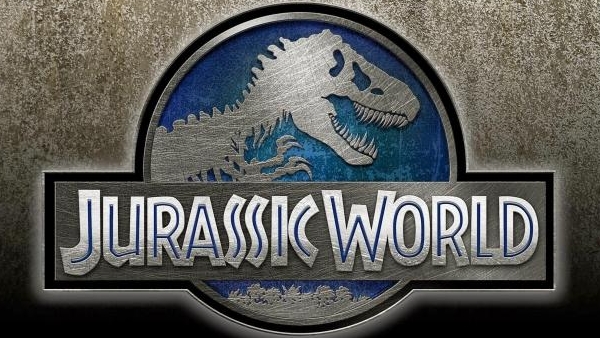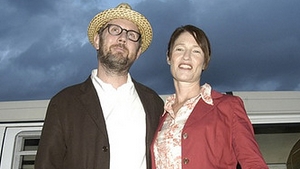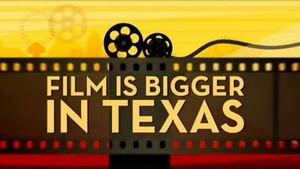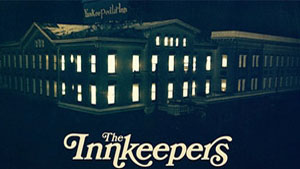
Editor’s Note: Go,See,Talk presents this review of The Innkeepers from our staff writer Andrew Crump (of A Constant Visual Feast.) Have a look at what he had to say about Ti West’s sophomore effort and offer your thoughts below.
Categorizing Ti West’s The Innkeepers accurately seems tricky at a glance; is it a horror film with comedy elements, or the other way around? Invariably, the film falls under the horror umbrella without much debate but its blend of scares, charm and laughter makes it a genre standout among more recent haunted house fare. Dread builds over the course of The Innkeepers, and inevitably that leads us to a suspenseful, frightening climax in which our worst fears become realized. But West’s fourth feature film may be best remembered for how much life he breathes into a story revolving around the mysteries, behaviors, and desires of the dead. In other words, break out your Ouija boards and get ready to be spooked.
The Innkeepers takes place almost entirely in the Yankee Pedlar Inn*, an older establishment enjoying its final weekend of 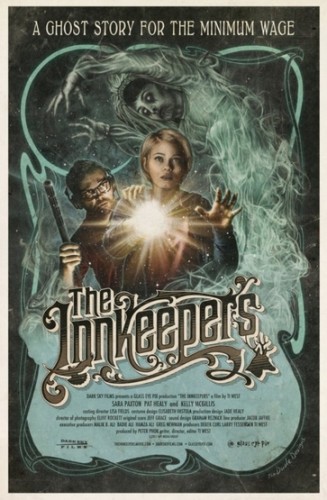 operation before it shuts its doors for good. Manning the hotel are Luke (Pat Healy) and Claire (Sara Paxton), the two suckers the inn’s owner picks to play host to a nearly negligible clientele in the establishment’s final hours. Our plucky duo also happen to be amateur ghost hunters; as we meet them, they’ve already undertaken an investigation of the Yankee Pedlarf in hopes of making contact with the spirit of Madeline O’Malley, the hotel’s famed resident specter. The question of whether they’ll succeed remains up in the air, but as the two trade off stationing the front desk and catching their beauty rests, eerie and unexplainable stuff starts happening, and we’re forced to confront the possibility that Madeline may not just be a folk legend after all.
operation before it shuts its doors for good. Manning the hotel are Luke (Pat Healy) and Claire (Sara Paxton), the two suckers the inn’s owner picks to play host to a nearly negligible clientele in the establishment’s final hours. Our plucky duo also happen to be amateur ghost hunters; as we meet them, they’ve already undertaken an investigation of the Yankee Pedlarf in hopes of making contact with the spirit of Madeline O’Malley, the hotel’s famed resident specter. The question of whether they’ll succeed remains up in the air, but as the two trade off stationing the front desk and catching their beauty rests, eerie and unexplainable stuff starts happening, and we’re forced to confront the possibility that Madeline may not just be a folk legend after all.
The first ingredient of The Innkeepers‘ excellence is found in the relationship between its principals. Claire and Luke are enormous fun to hang out with; they banter, they bicker, they quip, they tease one another. Their relationship works and reads as true, and it immediately wins us over and pulls us into the film’s cinematic space effortlessly. If ever the question is raised over the value of character development in horror, then maybe The Innkeepers should serve as something of a modern textbook that not only proves that element’s importance, but shows other filmmakers how to do it right.
Claire and Luke give us anchors. Plenty of strange stuff happens in The Innkeepers– the best of which I’d rather not give away, apart from remarking that the film underscores for me just how creepy pianos can be– but these very human characters are at the center of it all. Claire’s our main focus here, our leading protagonist, so the film spends the majority of its time tagging along with her as she tries her best to both serve the guests and come to grips with the oddness which slowly begins occurring around her; really, this is her story. The Innkeepersfirmly encapsulates a dichotomy between skepticism and belief, with Claire actively delving into the history of the inn to find the truth, while Luke– who owns the ghost-detecting paraphernalia both characters employ in their explorations of the Yankee Pedlar– scoffs at the idea of these things actually existing. Claire, despite Luke’s incredulity, soldiers onward to satisfy her curiosity despite numerous warnings and evil portents. Search as much as you like, the film seems say, but beware– you might not like what you uncover.
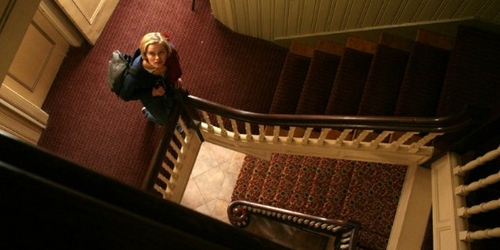
Characters, in the end, only comprise part of what makes The Innkeepers such a gem, and those moments of levity exist only as a part of the film’s slow-burning approach to its horror. This philosophy, so I understand, is simply part and parcel of how Ti West does things as a filmmaker– I have seen neither House of the Devil, the film of his oeuvre that’s received the highest praise, nor The Roost, so I can only go on hearsay. Regardless, his deliberate sense of pacing and his careful build-up of suspense lend themselves toward an economy of high-impact moments of nerve-wracking fear. The best scares come in the last half hour– though there are some choice ones throughout the rest of the film– and once the plot hits that precious mark, they become almost unceasing. There are no cheap, expected jump scares to be found here; it’s a climax of pure fright, executed with ghastly aplomb after earning its horror beats judiciously.
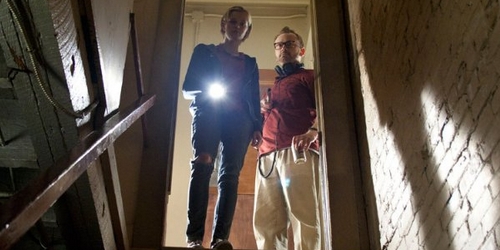
Atmosphere and tension mean the difference between making a proper horror film and the trite sort of chaff that tend to be forgotten within weeks of its release. The Innkeepers falls into the former distinction, unequivocally and categorically. This is a film that’s all about the establishment of setting and fostering a mounting sense of terror as Claire begins to learn that Madeline O’Malley’s ghost doesn’t believe in Casper’s doctrine of spectral affability. Eliot Rockett’s measured, paced-out cinematography does marvels to achieve both goals, but The Innkeepers‘ best tool for fully realizing its horror lies in sound designer Graham Reznick’s impressive aural efforts. Whether it’s musical cues or ambient noises– particularly those heard through EVP equipment– The Innkeepers uses its sound very, very effectively in its designs to scare the daylights out of its audiences. Plenty and frightening are the film’s images, but it’s the anxiety generated by even the slightest creak in the floorboards that proves most efficacious; before long you’ll be expecting things to leap out in front of the camera constantly. But the weight of expectation doesn’t deaden our nerves. It only heightens them, and The Innkeepers becomes deliciously, nigh-unbearably terrifying in its second half as a result.
G-S-T RULING:
The Innkeepers is seriously good without taking itself too seriously. I think it’s sort of cliche to call things “old-fashioned”, for a number of reasons, but it’s hard to think of a more appropriate label for what West has done here. The sensibility he brings to the film calls back to a less modern time that’s unconcerned with being relentlessly in-your-face and instead opts to build toward something much more memorably spooky and through more honest means. West wants to scare you. He wants you to walk away from The Innkeepers wondering if that bump you heard in your basement is something more sinister than the house settling. Hedoesn’t want to punish you into feeling afraid with disingenuous contemporary fear tactics, though. That The Innkeepers invites you to do so is a wonder. That it’s so wildly successful in its endeavors is nothing short of a horror triumph.

